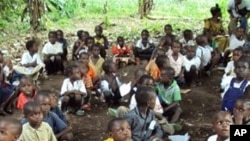The World Food Program has begun airlifting urgent food assistance to tens of thousands of Congolese refugees who fled the Democratic Republic of Congo into the neighboring Congo Republic. More than 120,000 refugees have fled to Congo Brazzaville since October to escape ethnic violence in the DRC.
The World Food Program has been distributing food to more than 59,000 Congolese refugees, mainly women and children, since the end of November. The agency's most recent distribution was carried out at the end of February for 3,000 new arrivals in Betou district.
WFP spokeswoman Emilia Casella says it is very difficult to get regular food supplies to the refugees who are camped out in a very remote area. She says the roads are largely impassable. So, WFP has had to start airlifts to beef up its food stocks in the area.
"We have been using barges along the river and, in fact, there is currently a barge loaded with 250 tons of rice and corn soy blend, as well as medical kits and other help headed to these people. And, hopefully it will get to them in about a week from now," said Casella. "It takes a couple of weeks to get up the river. But, this is the last barge we can get up the river as the water levels are getting too low."
As a consequence, Casella says food stocks have to be replenished quickly. So, over the coming weeks, she says WFP plans to airlift 600 metric tons of maize, pulses and salt. She says this will be enough to feed some 100,000 refugees for two weeks.
The refugees fled from Equateur province in the DRC after deadly clashes erupted in October between two tribes over fishing and farming rights.
They are scattered over 100 sites along a 600-kilometer stretch of land along the Oubangui river, which forms the border between the DRC and Republic of Congo.
Casella says the airlift can only bring in limited quantities of food, so WFP soon will begin sending in convoys of food through neighboring Cameroon. She says WFP hopes to have this route up and running by March 26.
"Coming through Cameroon is a much shorter and faster route and there are roads available that we can get to the people," said the spokeswoman. "So, we have a three-pronged approach. We are using airlifts right now. We will begin to use road routes through Cameroon and then, come July, the water level will have expected to rise again in the river and we will be able to use the barges again to get food to these people."
Casella says the refugees are living off fishing, hunting and cassava. She notes the heavy influx of Congolese refugees has practically doubled the population along the Republic of Congo side of the border. And this, she says, is posing big problems.
She says both the refugees and local residents are competing for the same scarce resources. She says WFP will try to ease the strain by providing food assistance to the most vulnerable people in the community who are hosting the refugees.
WFP Airlifts Food to Thousands of Congolese Refugees
